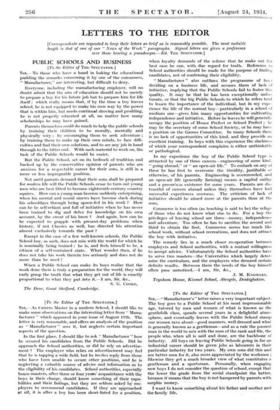[To the Editor of THE SPECTATOR.] Sin,—As Careers Master in
a modern School, I should like to make some observations on the interesting letter from Manu. facturer " which appeared in your issue of August 17th. The letter is very reasonable, and offers an analysis of the position as Manufacturer " sees it, but neglects certain important aspects of the question.
In the first place, I should like to ask " Manufacturer " how he secured his candidates from the Public Schools. Did he approach the School authorities, or did he rely on advertise- ment ? The employer who relies on advertisement may feel that he is tapping a wide field, but he invites reply from those who have been unable to secure other positions,, and he is neglecting a valuable source of advice and information as to the eligibility of his candidates. School authorities, especially house-masters, after three or four years'_acquaintance with the boys in their charge, should know something of their ca- pa: bilities and their failings, but they are seldom asked by em: ployers to recommend candidates. If they arc approached at all, it is after a boy has been short-listed for a position, when loyalty demands of the referee that he make out the best case he can, with due regard for truth. Reference to School authorities should be made for the purpose of finding candidates, not of confirming their eligibility.
" Manufacturer " also outlines the programme of boys deciding on a business life, and accuses them of lack of initiative, implying that the Public Schools fail to foster thii quality. It may be that he has been exceptionally unfor- tunate, or that the big Public Schools to which he refers tend to lessen the importance of the individual, but in my expe- rience the life of the normal boy—particularly in a school of medium size—gives him many opportunities for cultivating independence and initiative. Before he leaves he will generally occupy the position of House Prefect or School Prefect ; he may be the secretary of some School Society, or he may have a position on the Games Committee. In many Schools there is no lack of opportunities of this kind, and they provide an excellent training. In boys with this experience the slackness of which your correspondent complains is either unthinkable or pathological.
In my experience the boy of the Public School type attracted by one of three careers—engineering of some kind, " going abroad," or an open-air life." To embark on any of these he has first to overcome the timidity, justifiable or otherwise, of his parents. Engineering is overcrowded, and an open-air life (generally farming) means a capital outlay and a precarious existence for some years. Parents are dis- trustful of careers abroad unless they themselves have had successful experiences overseas. The criticism of lack of initiative should be aimed more at the parents than at the sons.
Commerce is too often (as teaching is said to be) the refuge of those who do not know what else to do. For a boy the privileges of leaving school are three—money, independence and adventure. Too often he has to sacrifice the second and third to obtain the first. Commerce seems too much like school work, without school recreations, and does not attract the boy with initiative.
The remedy lies in a much closer co-operation between employers and School authorities, with a mutual -willingness to accept advice. Unfortunately the School authorities have to serve two masters—the Universities which largely deter- mine the curriculum, and the employers who demand certain definite results. Between them the needs of the boy himself often pass unnoticed.—I am, Sir, &c., J. M. KNOWLES. Teynham House, Kinmel School, Abergele, Denbighshire.


































 Previous page
Previous page